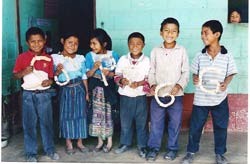
Challenge
In Guatemala's Quiché department, only half the children complete first grade - one symptom of a wider education problem that continues a cycle of illiteracy and poverty in the area, especially among rural, indigenous girls. Inefficiency in the education system is one of the root causes and particularly affects the lower grades.
Initiative
In 2003, USAID established the Salvemos Primer Grado (Let's Save First Grade) project to address the systemic inefficiencies that affect the first grade in rural indigenous Guatemala. Using active classroom approaches, Salvemos trains teachers to follow easy-to-implement strategies to track students' progress, including standardized tests and assessments, which are recorded on progress charts and shared with parents. Resources made from local materials, such as the "magic worm" - pliable wire threaded with corn cob sections to form letters, numbers and shapes - increase children's interest in learning and are novel for Guatemalan teachers. Parents, siblings and community elders are also invited to school to share important cultural traditions and knowledge with students, and they are shown how to reinforce school learning at home.
Results
As a result of Salvemos Primer Grado, 71 percent of Quiché's children now complete first grade, up from 51 percent in 2003. More children are now more securely positioned to continue and finish their full primary education. Salvemos has been so successful at alleviating first grade failure that the Ministry of Education adopted the program for national implementation. "The application of active methodology in the Salvemos Primer Grado classroom allows children to develop different skills, while permitting them to construct their own knowledge," said Education Ministry official José Alberto Hernández. "Teachers show their creativity in using contextualized materials and incorporate other activities that are not included in the methodological guides."







Comment
Make a general inquiry or suggest an improvement.